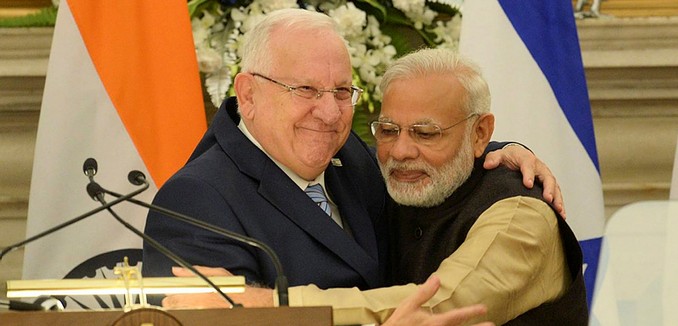Israeli President Reuven Rivlin praised his country’s growing ties with India while meeting with Indian leaders on a state visit Monday.
“I have no doubt that my visit here will help the ties and the cooperation between our two peoples grow stronger: in security and our ability to keep our people safe, in agriculture, in water, in technology, in culture and education,” Rivlin said at a joint press conference with Indian Prime Minister Narendra Modi.
Modi centered his remarks on the two countries’ military cooperation, as well as the shared threat both countries face from terrorism. During their meeting, Modi recounted, “we noted the strength of our growing defense partnership and agreed on the need to make it more broad-based through production and manufacturing partnerships.”
“President Rivlin and I deeply value our strong and growing partnership to secure our societies,” Modi continued. “Our people are constantly threatened by forces of terrorism and extremism. We recognize that terrorism is a global challenge, knows no boundaries and has extensive links with other forms of organized crime.”
Modi called on the international community to act with “resolve and determination” to fight terrorists as well as the nations that sponsor them. “Failure to act and silence of speech only encourages the terrorists. We agreed to intensify our cooperation to combat the forces of extremism and radicalization that threaten all peace-loving nations,” Modi added.
Rivlin is the second Israeli president to visit India. His visit coincides with the 25th anniversary of the establishment of diplomatic relations between the two nations.
Rivlin also met on Monday with Indian President Pranab Mukherjee at the Presidential Residence in New Delhi. Mukherjee became the first Indian president to visit Israel last year.
Two years ago, Israeli Prime Minister Benjamin Netanyahu met with Modi on the sidelines of United Nations General Assembly. “We’re very excited by the prospects of greater and greater ties with India, we think the sky is the limit,” Netanyahu said at the time.
Israel’s ties with India have been steadily improving since Modi’s election in 2014. Israel is now one of the top military suppliers to India, with sales of up to $1 billion annually. The two countries have also embarked on the joint development of the Barak-8 surface-to-air missile, which the two countries’ navies successfully tested together last December. Trade with India, which had already reached $6 billion annually before Modi’s election, continues to be robust. MASHAV, Israel’s international development agency, has established fifteen bases across India to assist in agriculture partnerships. And as Rivlin pointed out in an op-ed in India’s Economic Times, more than 10 percent of foreign exchange students in Israel are from India.
In The Most Important New Alliance in Asia, which was published in the October 2016 issue of The Tower Magazine, Harry Hoshovsky addressed the question as to whether the burgeoning ties between Israel and India are more stylistic or substantive.
Despite such progress, Ronak D. Desai wondered in a recent article for Foreign Policy whether the rekindled relationship between Israel and India under the Modi administration is truly indicative of a fundamental alteration in Indian foreign policy.
There are two important indicators in regard to this question: First, there is Modi’s upcoming visit to Israel. Such visits have often had a momentous impact. Nixon’s visit to China in 1972 fundamentally altered the political dynamics of the Cold War. As the first Arab leader to visit Israel, Anwar Sadat’s 1977 arrival paved the way for the peace treaty that Egypt and Israel would sign two years later.
Second, the recent change in India’s voting pattern at the UN, from its prior auto-pilot anti-Israel stance to one where it has now abstained three times on Israel-related votes, has already been heralded by Jerusalem as reflecting a “qualitative change in the [Indo-Israeli] relationship.” Throw in the personal chemistry between Netanyahu and Modi (reflected in their repeated tweets to each other), and what emerges is not only a repeat of the previous BJP government’s policies, but something much more potent.
Modi’s anticipated visit to Israel represents a historic opportunity to accomplish two interconnected foreign policy objectives. India will demonstrate to its Arab partners that a new era of Indo-Israeli relations is underway. And by establishing a new diplomatic status quo, Modi and the BJP will make it very challenging for the INC or any other political party to reverse it.
Thus, in the debate raised by Desai over whether the recently rekindled Indo-Israeli relationship is more stylistic than substantive in nature, all signs point toward the latter.
[Photo: Mark Neyman / GPO ]




